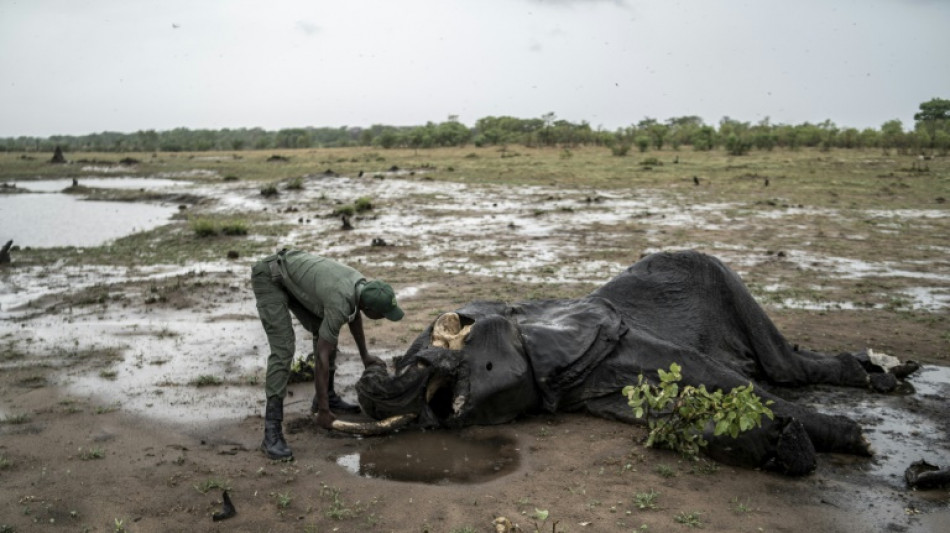
-
 USA defeat Canada for Olympic men's ice hockey gold, Trump celebrates
USA defeat Canada for Olympic men's ice hockey gold, Trump celebrates
-
EU 'expects' US to honour trade deal as Trump hikes tariffs

-
 'GOAT' battles to top of N. America box office
'GOAT' battles to top of N. America box office
-
South Africa thrash India to end 12-match T20 World Cup win streak

-
 Bielle-Biarrey breaks record as France beat Italy in Six Nations
Bielle-Biarrey breaks record as France beat Italy in Six Nations
-
US says trade deals in force despite court ruling on tariffs

-
 Barcelona back top of La Liga with Levante win
Barcelona back top of La Liga with Levante win
-
Gu strikes gold, USA beat Canada in men's ice hockey

-
 What's behind England's Six Nations slump?
What's behind England's Six Nations slump?
-
Napoli rage at officials after loss at Atalanta

-
 Liverpool late show floors Nottingham Forest
Liverpool late show floors Nottingham Forest
-
Rimac Nevera R: Beyond imagination

-
 USA beat Canada to win men's Olympic ice hockey gold
USA beat Canada to win men's Olympic ice hockey gold
-
Samardzic seals comeback win for Atalanta over Napoli

-
 Eileen Gu switches slopes for catwalk after Olympic flourish
Eileen Gu switches slopes for catwalk after Olympic flourish
-
Luce: Ferrari's ingenious electric revolution

-
 Miller guides South Africa to 187-7 against India
Miller guides South Africa to 187-7 against India
-
Scotland boss 'proud' of comeback Six Nations win over Wales

-
 Iranian students rally for second day as fears of war with US mount
Iranian students rally for second day as fears of war with US mount
-
US Secret Service kills man trying to access Trump Florida estate

-
 Coventry 'let the Games do their magic': former IOC executives
Coventry 'let the Games do their magic': former IOC executives
-
Cayenne Turbo Electric 2026

-
 Sri Lanka have to qualify 'the hard way' after England drubbing
Sri Lanka have to qualify 'the hard way' after England drubbing
-
Doris says Six Nations rout of England is sparking Irish 'belief'

-
 Thousands of pilgrims visit remains of St Francis
Thousands of pilgrims visit remains of St Francis
-
Emotional Gu makes history with Olympic freeski halfpipe gold

-
 Impressive Del Toro takes statement victory in UAE
Impressive Del Toro takes statement victory in UAE
-
Gu wins triumphant gold of Milan-Cortina Olympics before ice hockey finale

-
 England rout Sri Lanka for 95 to win Super Eights opener
England rout Sri Lanka for 95 to win Super Eights opener
-
Underhill tells struggling England to maintain Six Nations 'trust' as Italy await

-
 Alfa Tonale 2026: With a new look
Alfa Tonale 2026: With a new look
-
BMW 7 Series and i7: facelift in 2026

-
 Eileen Gu makes history with Olympic freeski halfpipe gold
Eileen Gu makes history with Olympic freeski halfpipe gold
-
Eileen Gu makes history with Olympic halfpipe gold

-
 Morocco flood evacuees mark muted Ramadan away from home
Morocco flood evacuees mark muted Ramadan away from home
-
Lucid Gravity 2026: Test report

-
 Sri Lanka restrict England to 146-9 in T20 World Cup Super Eights
Sri Lanka restrict England to 146-9 in T20 World Cup Super Eights
-
West Indies wary of Zimbabwe's 'X-factor' quick Muzarabani

-
 Bentley: Visions for 2026
Bentley: Visions for 2026
-
Eileen Gu wins Olympic gold in women's freeski halfpipe

-
 First 'dispersed' Winter Olympics a success -- and snow helped
First 'dispersed' Winter Olympics a success -- and snow helped
-
Six stand-out moments from the 2026 Winter Olympics

-
 Andrew's arrest hands King Charles fresh royal crisis
Andrew's arrest hands King Charles fresh royal crisis
-
Afghans mourn villagers killed in Pakistani strikes

-
 Jeeno Thitikul brings home LPGA win in Thailand
Jeeno Thitikul brings home LPGA win in Thailand
-
Snowboard champion Karl '99 percent' sure parallel giant slalom will stay in Olympics

-
 Greenland does not need US hospital ship: Danish minister
Greenland does not need US hospital ship: Danish minister
-
Russian missile barrage hits energy, railways across Ukraine

-
 Ka Ying Rising makes Hong Kong racing history with 18th win
Ka Ying Rising makes Hong Kong racing history with 18th win
-
St Francis relics go on public show for first time in Italy


Heartbreak in Zimbabwe park: elephants' desperate hunt for water
Storm clouds are finally gathering over Zimbabwe's biggest animal reserve, but it has come too late for more than 110 elephants that have died in a searing, extended drought.
There is little that Simba Marozva and other rangers at the Hwange National Park can do except cut the tusks off the rotting corpses before poachers find them.
With the black clouds in recent days promising life-saving rains, the rangers may not find all of the victims of the drought on their daily hunts.
The 14,600-square-kilometre (5,600-square-mile) park -- bigger than many countries -- is home to more than 45,000 savanna elephants, so many that they are considered a threat to the environment.
The scene is still heart-breaking.
Blackened corpses scar a landscape where the rains have been more than six weeks late and scorching temperatures have regularly hit 40 degrees Celsius (104 Fahrenheit).
Tinashe Farawo, spokesperson for the Zimbabwe national parks authority, Zimparks, said "the old, the young and the sick" have been worst hit.
Some have fallen in dried-up waterholes, some spent their final hours in the shade of a tree.
Many are infant elephants -- but all that is left is the shrivelled skin over the rotting carcass.
- Grim tusk collection -
The intact tusk is a sign that it was a natural death. But there is a heavy stench around the elephants, that have attracted growing attention in recent years.
On average, an elephant drinks more than 200 litres (50 gallons) of water and eats some 140 kilos (300 pounds) of food a day.
More than 200 elephants died in a 2019 drought but the rangers say it could be worse this time once the end of the summer arrives.
Hwange is part of the Kavango- Zambezi Transfrontier Conservation Area covering parks in Angola, Botswana, Namibia, Zambia and Zimbabwe. All have borders on the Okavango and Zambezi river basins.
An aerial survey started in 2022 estimated the region's elephant population at 227,900 animals.
While tens of thousands of elephants have been slaughtered across Africa by poachers and hunters since the 1970s, the Kavango-Zambezi conservation area is considered a success story with numbers mainly growing.
That has increased pressure on Hwange's resources while climate change has emerged as a new risk.
The estimated 100,000 elephants in Zimbabwe is twice the capacity of its parks, conservationists say.
Farawo from Zimparks said 112 elephant deaths had been confirmed since September.
- Over-population threat -
He said the numbers were not surprising given the huge size of the elephant population in Hwange.
"We have high temperatures and we have no water. They are bound to be stressed and die."
Climate change has increased the number of droughts, he added.
"It's not only elephants which are affected, there are also other animals. Elephants can be easily noticed because of their size."
Farawo said the parks authority was also concerned that the elephants had become "overpopulated" and "are destroying the habitat."
Hwange, covered in dry grass, leafless trees and some desert-like open areas, has 104 solar-powered boreholes across the park to reach further into the water table that falls lower each year.
But it has not been enough, and the drought which has hit several southern African countries, has been worsened this year by the El Nino phenomenon.
The hunt for water has taken elephants dangerously close to human habitations on the fringes of Hwange.
They have drunk in desperation from swimming pools in private homes and risked drinking at water holes contaminated by dead animals.
Dried-up water holes are forcing elephants and other wildlife to walk long distances for food and water.
Some have crossed into Botswana and other neighbouring countries where many deaths have also been reported.
L.Mason--AMWN



